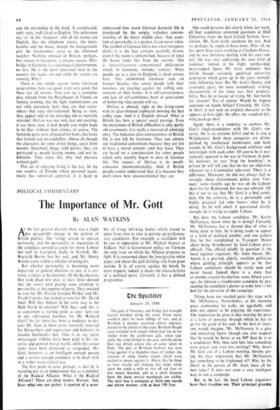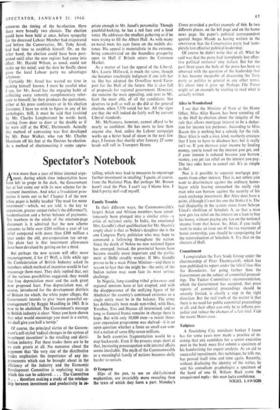POLITICAL COMMENTARY
The Importance of Mr. Gott
By ALAN WATKINS
T the last general election there was a slight but perceptible change in the pattern of British politics. The 'swing' ceased to operate nationally, and the personality or reputation of the candidate seemed to count for more. Labour did well in Liverpool, badly in Norfolk. Mr. Reginald Bevins lost his seat, and Mr. Henry Brooke came within a whisker of losing his.
But whether personality is becoming more important at general elections or not, it is cer- tainly a factor at by-elections. Of the by-elections that took place last year, at least three showed that the voters were paying some attention to personality at the expense of party. They omitted to vote for Mr. Patrick Gordon Walker and Mr. Frank Cousins, but rushed to vote for Mr. David Steel. Will they behave in the same way in the Hull North by-election? Will they—and this is as convenient a starting point as any—turn out in any substantial numbers for Mr. Richard Gott? So far there has been a tendency to dis- cuss Mr. Gott in those terms normally reserved for flat-earthers and vegetarians and believers in Joanna Southcott's box. That is to say, quite extravagant tributes have been paid to his sin- cerity and general moral worth, while his actual views have been dismissed as misguided. Mr. Gott, however, is an intelligent enough person and a serious enough candidate to be dealt with in a rather more critical way.
The first point to note, perhaps, is that he is standing not as an independent but as a member of the Radical Alliance. What is the Radical Alliance? These are deep waters, Watson: but, horn what one can gather, it consists of a num- ber of fringe left-wing bodies which intend to unite from time to time in putting up parliamen- tary candidates. For example, a candidate will be run in opposition to Mr. Michael Stewart at Fulham. Nor is Government policy on Vietnam the only issue on which the Alliance proposes to fight. It is concerned about the immigration white paper and about the gulf dividing rich from poor nations. It is, of course, against the bomb. In most respects, indeed, it shows the characteristics of a political party. Certainly it has a defined programme. One could perceive this clearly when, last week, all four candidates answered questions at Hull University from the local United Nations Asso- ciation. Mr. Gott easily outshone the rest. And so, perhaps, he ought to have done. After all, he has spent three years working at Chatham House, and he was therefore dealing with his own sub- ject. He was also addressing his own kind of audience; indeed, in his slight, red-bearded, beret-topped figure Mr. Gott embodies that leftish though curiously apolitical university generation which grew up in the years immedi- ately following Suez. But Mr. Gott's fluency and assurance apart, the most immediately striking characteristic of his views was their predicta- bility. Was he in favour of trying Mr. Ian Smith for treason? Yes of course. Would he impose sanctions on South Africa? Certainly. Mr. Gott, in short, is not such an original character as he appears at first sight. He offers the standard left- wing package deal.
Again, there is a tendency to confuse Mr. Gott's single-mindedness with Mr. Gott's sin- cerity. He is an extreme leftist and he is also a Wykehamist. Both these categories are distin- guished by intellectual intolerance; and both strands in Mr. Gott's background reinforce and intermingle with each other. Of course he is pas- sionately opposed to the war in Vietnam. In pub- lic, however, he says 'Stop the bombing'; in private he will tell you that he has no objection whatever to a Communist take-over. There is a difference. Moreover, he did not always feel so strongly about Government policy over Viet- nam: some months ago he was on the Labour' short list for Richmond, but was not selected. All this is not to say that Mr. Gott is a bad candi- dale. On the contrary, he is a personable and highly practical lad who knows what he is doing. As he will admit if questioned closely enough, he is trying to topple Labour.
But does the Labour candidate, Mr. Kevin McNamara, know what he is doing? Certainly Mr. McNamara has a shrewd idea of what is being done to him; he is being made to appear as a kind of political zombie; and one gathers that he has complained to Transport House about being `browbeaten' by local Labour party officials. The official chiefly in question is the local regional organiser, Mr. John Anson. Mr. Anson is a gnarled, elderly, machine politician whose guiding principle appears to be that Labour candidates should be rarely seen and never heard. Indeed there is a story that at another crucial by-election, some fifteen years ago, he silenced a troublesome candidate by per- suading the candidate's doctor to order him to his bed for the duration of the campaign.
Things have not reached quite this stage with Mr. McNamara. Nevertheless, at his morning press conference he walks on egg-shells, and does not appear to be enjoying the experience. The impression he gives is that meeting the press is a form of penance through which he has to go for the good of his soul. At the best of times, one would imagine, Mr. McNamara is a grey and unexciting figure (though one also suspects that he would be better as an MP than he is as a candidate). Why then turn him into something even greyer and even less exciting? Why throw Mr. Gott out of a Labour meeting, thereby giv- ing the clear impression that Mr. McNamara has something to be frightened of? Why let the Devil, in the person of Mr. Gott, have all the best tunes? It does not seem a very intelligent way to run a campaign.
But, to be fair, the local Labour organisers have their troubles too. Their principal grumble concerns the timing of the by-election. Here there were broadly two choices. The election could have been held at once, before sympathy for the deceased Labour Member had evaporated and before the Conservative, Mr. Toby Jessel, bad had time to establish himself. Or, on the other hand, the election could have been post- poned until after the new register had come into effect. Mr. Harold Wilson, as usual, could not make up his mind; and the date he finally chose gives the local Labour party no advantages whatever.
Certainly Mr. Jessel has wasted no time in making himself known. I must be careful what I say, for Mr. Jessel has the engaging habit of collecting every remotely complimentary refer- ence to himself; he then produces the quotations, either at his press conferences or in his election literature. I have no wish to figure in any of his anthologies. Still, it must be said that (assisted by Mr. Charles Longbottom) he works hard, trotting from door to door at the double as if he were still at the RNC, Dartmouth. Actually this method of canvassing was first developed by Mr. Peter Walker, who ran Mr. Charles Morrison off his feet at the Devizes by-election. As a method of electioneering it seeps appro-
priate enough to Mr. Jessel's personality. Though youthful-looking, he has a red face and a loud voice. He addresses the smallest gathering as if he were trying to fill the Albert Hall. As with many ex-naval men, his eyes focus on the middle dis- tance. His appeal is materialistic in the extreme, being concentrated on the boundless prosperity open to Hull if Britain enters the Common Market.
As a matter of fact the appeal of the Liberal, Mrs. Laurie Millward, is much the same, though she becomes touchingly indignant if one tells her so. She has adopted the Orwellian word Euro- port for the Hull of the future. She is also full of proposals for regional government. However, she remains the most appealing, and next to Mr. Gott the most able, of all the candidates. She deserves to poll as well as she did at the general election, when 7,570 voted for her. All the signs are that she will indeed do fairly well by current Liberal standards.
Mr. McNamara, however, cannot afford to be nearly so confident. He has more to lose than anyone else. And, unless the Labour campaign works up a better head of steam in the next few days, I foresee that shortly after January 27 some heads will roll in Transport House.



































 Previous page
Previous page